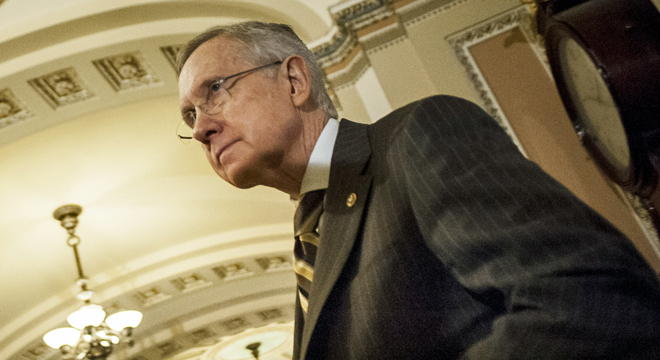Updated: 2:05 P.M.
The filibuster reform endgame is coming into focus.
Reformers are closing ranks behind a more modest proposal by Majority Leader Harry Reid (D-NV) that they believe could pass with a 51-vote threshold when the Senate returns next week and chip away at the minority party’s power to obstruct. It represents a concession that the full “talking filibuster” they want may not happen. But accepting the emerging Reid proposal would ward off a competing plan that they consider weaker than Reid’s.
Sen. Jeff Merkley (D-OR) says he’s still fighting for the talking filibuster and believes it can pass. His aide said he isn’t convinced the Reid plan would take on the core problems of the Senate, but Merkley didn’t rule it out.
“I believe that when Majority Leader Reid says, ‘Here is my package and I need you all to back it,’ he will have 51 votes behind him,” Merkley told TPMPrime members during a live chat Wednesday.
Leaders of Fix The Senate Now, an outside pro-reform coalition, also prefer a more robust talking filibuster, but have signaled openness to embracing the Reid plan, wary of seeing the whole effort to reform the filibuster collapse.
“We’re optimistic that some good changes are going to happen,” said Shane Larson, the legislative director for Communications Workers For America, whose group has already spent more than $300,000 on TV ads in the D.C. area pushing filibuster reform. “We’re very optimistic that we’re going to get there, that we’ll have 51 votes to put this through.”
Reid’s emerging package would require a filibustering minority of senators to occupy the floor and speak after the debate has begun. But they would retain the ability to force a 60-vote threshold for the first motion to begin debate (which reformers would prefer to also get rid of). After that, the plan would shift the burden from the majority seeking to advance legislation or nominations to the minority seeking to block them.
Currently the onus in on the majority to keep at least 51 senators in the chamber while advancing proposals to maintain a quorum, while the filibustering minority simply has to send one senator to the floor to speak until the majority folds. The fact that the rules make it harder to move proposals than to block them is what gave rise to the silent filibuster.
“Right now I have it set up so it’d be done post-cloture, but still, that creates a little talking on the floor that we don’t have now,” Reid recently told a Nevada TV station. “If somebody wants to stall things let them stand and stall, not hide back in some office someplace.”
His plan would also eliminate a rule requiring a 30-hour gap between cloture and a final vote on a measure and would make it easier for the Senate to go to conference with the House.
The heart of the proposal by Sens. Jeff Merkley (D-OR) and Tom Udall (D-NM) is what they call the “full talking filibuster,” which would require a minority trying to filibuster any Senate business to occupy the floor and speak ceaselessly until one side gives in. As badly as proponents want this, they don’t want to demand it at the expense of losing critical Democratic votes and seeing Reid’s partial talking filibuster plan collapse.
The alternate proposal, by Sens. Carl Levin (D-MI) and John McCain (R-AZ), contains many of the reforms in the Reid plan, but also guarantees the minority party two amendments to legislation regardless of relevancy. Reid, Merkley and outside reformers strongly oppose that provision, fearing that Republicans will use it to poison bills.
A spokesman for Senate Minority Leader Mitch McConnell (R-KY), whose recent negotiations with Reid on a possible filibuster deal do not appear to have gone anywhere, did not immediately respond to a request for comment. Republicans have roundly warned Democrats not to change the rules without bipartisan consent, and some are strongly opposed to any reforms that would weaken the filibuster.
Merkley said that among 55 Democratic senators, some are still studying the proposal, but there’s only one clear opponent of using the constitutional option to change the rules.
“As of this point, the only person who has said that he will definitely oppose Reid’s package if it is to be done with 51 votes is Senator Levin,” he told TPMPrime, while acknowledging the obstacles reformers face. “There is a big challenge in changing the Senate culture. It has gone so long without adjusting to disappearing social contracts that made the Senate work that many senators find changing the rules to be a difficult leap.”










